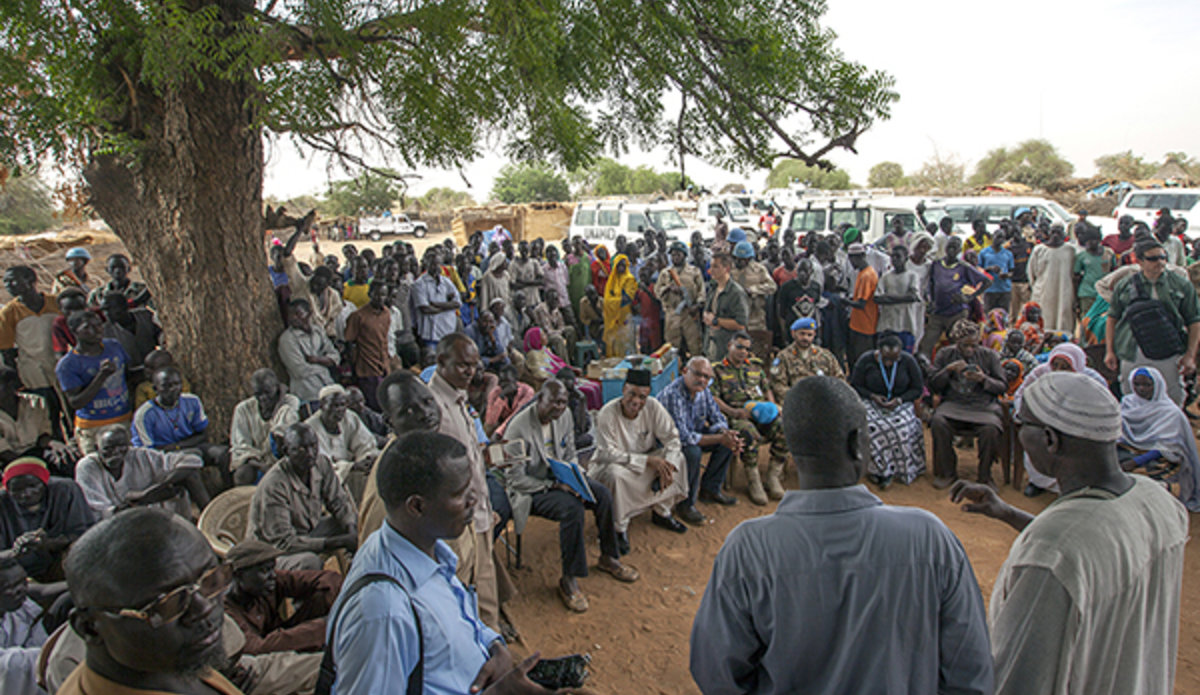UNAMID JSR tours the Mission’s sector headquarters across Darfur
El Fasher, 8 May 2016 – As part of his meetings with senior UNAMID officials, state authorities, and the local community, the AU-UN Joint Special Representative, Martin Uhomoibhi, visited Zalingei, Central Darfur, El Geneina, West Darfur; Nyala, South Darfur, El Daein, East Darfur; between 2-6 May 2016.
During his visit, Mr. Uhomoibhi held formal meetings, consultations, popular conferences and discussions with a broad spectrum of Darfuri entities, including with key state authorities (Governors of States, Government of Sudan military and police officials and State security authorities) , internally displaced persons (IDPs) refugees and their representatives, native administration and community leaders (nazirs, umdahs and chieftains) as well as UNAMID staff and members of the UN Country Team in the sectors, in order to exchange views on UNAMID’s mandate and his efforts as Joint Chief Mediator in relation to the Darfur peace process.
First the JSR visited Zalingei and met with the acting Wali (Governor) and state officials of Central Darfur and discussed with them the Mission’s mandate and the impact of the ongoing fighting in Jebel Marra on the state. In this connection, the JSR raised the issue of access restrictions and their negative impact on the Mission’s ability to provide accurate and truthful reports reflecting the reality on the ground.
The second leg of the JSR’s tour was to El Geneina. After a formal call on the Acting Wali and state officials, Mr. Uhomoibhi and his delegation visited Ardamata camp for the displaced in West Darfur and met with the camp's residents in a popular conference. He shared with Ardamata residents his recent mediation efforts as Joint Chief Mediator and underlined the importance of non-signatory armed movements joining the peace efforts to bring peace to Darfur.
The following day, the JSR visited Nyala and met the state authorities. He then visited Kalma camp for the internally displaced where he met with the residents and urged them to exercise restraint in the wake of a recent shootout in the camp’s market by unidentified armed men and assure them of UNAMID’s commitment to their protection. He also discussed with UNAMID Sector South leadership ways of augmenting the Mission’s protection efforts to meet the needs of the population we serve in South Darfur, particularly the displaced women and children who tend to bear the brunt of such attacks. Additionally, he listened to demands from the IDPs for additional patrolling and support to community policing projects in the camp.
In El Daein, the final leg of the JSR’s visit to the sectors, he met with the Wali of East Darfur as well as native administration leaders and urged them to work in mutual cooperation to resolve longstanding tribal conflicts in the state. He reiterated UNAMID’s readiness to do its utmost to support these reconciliation efforts within its capability. Mr. Uhomoibhi also visited the Khor Omer camp near El Daein where thousands of South Sudanese refugees have sought shelter on account of the past period of instability which South Sudan had experienced. He held a popular conference attended by the South Sudanese refugees and interacted extensively with their tribal chieftains and the relief agencies operating in the camp. Ambassador Uhomoibhi commended the efforts of East Darfur State in hosting their South Sudanese neighbors and observed that this is one more reason that Darfur should have peace in order to turn from a troubled region into a safe resort.
During his interactions throughout the entire tour, JSR Uhomoibhi impressed upon the need for all the stakeholders – the federal and state authorities, UNCT partners, UNAMID staff, Native Administration mechanisms in the various states and the wider population of Darfur – to cooperate in putting together a comprehensive access strategy that would go a long way towards facilitating humanitarian access across Darfur and ensuring that UNAMID’s reporting is based on first-hand observations of the situation and not third party accounts.
 UN
UN United Nations Peacekeeping
United Nations Peacekeeping


